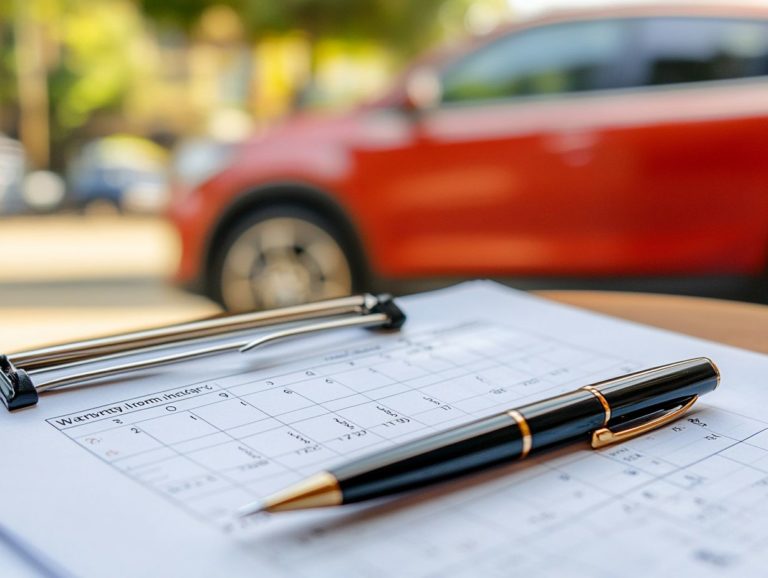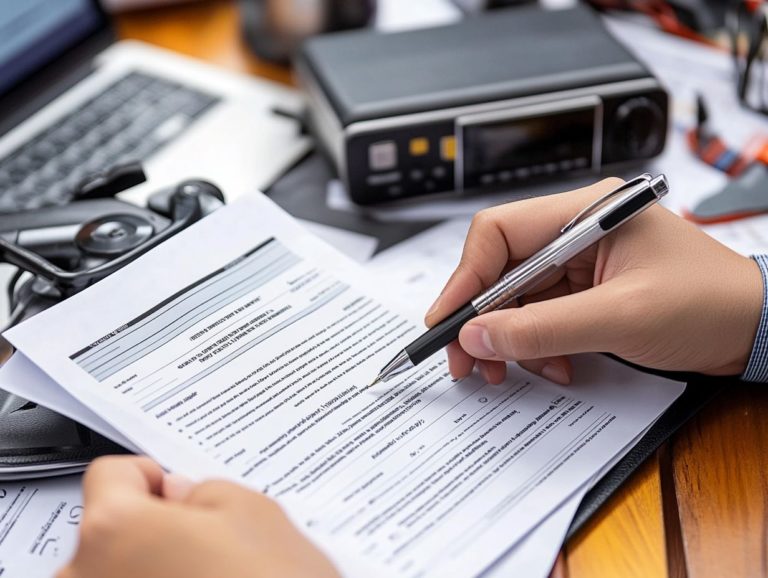Understanding the Lemon Law and Warranties
If you’ve ever faced the frustration of a broken car, you may wonder about your rights and options. The Lemon Law protects consumers who buy defective cars, ensuring you have a pathway to seek recourse for your troubles.
This article explains the Lemon Law, types of warranties, and what qualifies a vehicle as a “lemon.” It will guide you through the essential steps to take if you find yourself in this aggravating situation and explore alternatives for resolving vehicle issues.
Understand your consumer rights and confidently navigate lemon claims.
Contents
Key Takeaways:
- Know the Lemon Law’s definition and purpose to understand your rights as a consumer.
- Familiarize yourself with types of warranties like manufacturer and extended warranties.
- Understand the criteria for a vehicle to be considered a “lemon” and the steps to file a claim for compensation.
Discover Your Rights Under the Lemon Law!
The Lemon Law stands as a crucial protection for consumers who find themselves with defective vehicles. It offers a legal pathway to hold manufacturers accountable when they neglect their warranty commitments.
This law shields buyers from the frustration of ‘lemons’—vehicles plagued by persistent defects—enabling you to pursue remedies such as repairs, replacements, or even compensation.
Within the framework of the Magnuson-Moss Warranty Act, the Lemon Law further fortifies your rights by requiring manufacturers to maintain quality standards and provide appropriate documentation for warranty claims.
Definition and Purpose
The Lemon Law is crafted to shield you from the financial strain of owning a broken car by offering a structured pathway to seek compensation.
This law usually applies to new and certified pre-owned vehicles with major defects affecting their use, safety, or value. Protection extends to various types of vehicles, such as cars, trucks, and SUVs, as long as they meet specific criteria.
To successfully file a claim, it’s essential to maintain comprehensive vehicle documentation, including a detailed record of repair history and communications with the manufacturer or dealer.
Knowing your consumer rights enables you to pursue remedies, usually involving repairs, replacements, or refunds. This ensures you aren’t stuck with a broken car that falls short of expected standards.
Types of Warranties
It’s crucial to understand different types of warranties when owning a vehicle. These warranties offer varying levels of coverage for repairs and defects, making them pivotal for informed decisions.
Manufacturer warranties typically safeguard critical components like the engine and transmission. Extended warranties provide extra protection beyond the factory offering. If you’re particularly concerned about drivetrain issues, a powertrain warranty is your best bet.
A bumper-to-bumper warranty covers a comprehensive range of vehicle parts, including both parts and labor, ensuring you’re well-protected against unexpected repair costs.
Understanding Manufacturer and Extended Warranties
Manufacturer warranties, issued by the vehicle manufacturer, cover defects in materials and workmanship for a specified period. Extended warranties, offered by third-party providers, provide additional coverage beyond the original warranty.
Both warranties protect you from unexpected repair costs, but they differ in coverage limits. Manufacturer warranties focus on essential components like the engine, transmission, and drivetrain, while extended warranties cover more issues, including electrical systems and specialized parts.
The terms of extended warranties vary widely, making it crucial to evaluate what each plan covers and how it fits your driving habits.
Qualifications for Lemon Law Protection
To qualify for Lemon Law protection, your vehicle must meet specific performance criteria and have a certain number of repair attempts for defects.
Your vehicle should have consistent defects that seriously affect its use, value, or safety. The manufacturer must have had a reasonable chance to fix these issues, usually through multiple repair attempts.
Criteria for a Vehicle to be Considered a ‘Lemon’
A vehicle is considered a ‘lemon’ if it has a significant defect affecting safety, value, or usability, along with multiple unsuccessful repair attempts. This situation arises when the same issues persist despite the manufacturer’s efforts to fix them.
Your repair history is crucial in determining eligibility for Lemon Law protection. Manufacturers are required to provide adequate support for defects, ensuring you aren’t left with a broken vehicle.
If a defect impacts your vehicle’s use or safety, assert your rights under the Lemon Law.
Steps to Take if You Have a Lemon
If you think your vehicle might be a lemon, take steps to file a claim under the Lemon Law to seek the compensation you deserve.
Begin by meticulously documenting all repair attempts and preserving records of your communications with the manufacturer or dealer. Familiarize yourself with your rights as a consumer as well.
By following these steps, you bolster your case and ensure compliance with the legal requirements for a successful claim.
Filing a Claim and Seeking Compensation
Filing a claim under the Lemon Law requires careful preparation and thorough documentation to seek compensation for your defective vehicle.
Accurate documentation is imperative, serving as the backbone of your claim. This includes records of repairs, communications with the dealer, and any critical information about your vehicle’s performance issues. Understand the legal requirements to navigate this process effectively.
Enlisting legal representation can enhance your chances of a favorable outcome. Attorneys specializing in consumer rights have the expertise needed to navigate the complexities of the process.
Alternatives to Pursuing Lemon Law Protection
Pursuing Lemon Law protection is a good option for many consumers with vehicle issues. However, consider alternative routes that may also lead to satisfying resolutions.
Options like negotiating directly with the manufacturer, utilizing service contracts, or seeking mediation through dispute resolution services may offer effective solutions without prolonged legal battles.
Don’t hesitate to explore these options for a better vehicle experience!
Other Options for Resolving Vehicle Issues
When you encounter vehicle issues, consider negotiating directly with your vehicle manufacturer or dealer.
Start a conversation with the dealer. Share your concerns and find solutions together. Using service contracts can help cover specific repairs without straining your finances.
Keeping detailed records of your vehicle’s history is essential. It helps track repairs and strengthens your position.
If the situation feels overwhelming, seek legal advice. This offers insight into your rights and ensures you follow consumer protection resources for fair treatment.
FAQs
What is the Lemon Law?
The Lemon Law protects consumers who buy defective vehicles. It requires manufacturers to replace or refund a vehicle with a significant defect that can’t be repaired after reasonable attempts.
How do I know if my vehicle is covered by the Lemon Law?
The Lemon Law generally covers new vehicles purchased for personal use. Used vehicles, motorcycles, and recreational vehicles are usually not covered.
What is considered a “reasonable” number of repair attempts?
It usually requires 3-4 attempts, but serious safety issues may need just one attempt. If the vehicle has been in the repair shop for an extended period, it may also qualify.
What is a warranty?
A warranty is a promise from the manufacturer or seller. It ensures the product meets certain standards and covers repairs for a set time or mileage.
What are the different types of warranties?
There are two main types of vehicle warranties: the manufacturer’s warranty and the extended warranty. The first is provided by the manufacturer, while the second can be purchased to extend coverage.
Can the Lemon Law be applied to other products besides vehicles?
The Lemon Law is mainly for vehicles but can apply to other products like appliances and electronics. Check your state’s laws for specifics.

.jpg_00.jpeg)
.jpg_01.jpeg)
.jpg_10.jpeg)
.jpg_11.jpeg)



